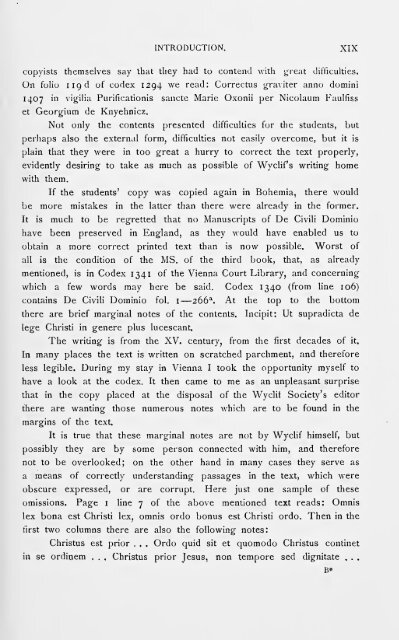- Page 4: Digitized by the Internet Archivein
- Page 8 and 9: BOSTON COtLEGE LIBRASYCHESTNUTHILL.
- Page 10 and 11: VIINTRODUCTION.for any reforming th
- Page 12 and 13: VIIIINTRODUCTION.(jf tbe state at h
- Page 14 and 15: XINTRODUCTION.property, the real te
- Page 16 and 17: XIIINTRODUGTION.if every estate in
- Page 18 and 19: XIVINTRODUCTION.sword, a plain rete
- Page 20 and 21: XVIINTRODUCTION.Of the mendicant fr
- Page 24 and 25: XXINTRODUCTION.Christus minister .
- Page 27 and 28: hucCAPITULUM NONUMDECIMUM.Uecimo no
- Page 29 and 30: .=)superior.ApostolusdecimeCAP. XIX
- Page 31 and 32: CAP. XIX.] LIBER TERTIUS. 381sumere
- Page 33 and 34: IquibusCAP. XIX.] LIBER TERTIUS. 38
- Page 35 and 36: castitatem.CAP. XIX.] LIBER TERTIUS
- Page 37 and 38: duciturCAP. XIX.] LIBER TERTIUS. 38
- Page 40 and 41: nonper390 DE CIVILI DOMINIO. [^AP.
- Page 42 and 43: oportet392 DE ClVn.I DOMINIO. [
- Page 44 and 45: adseculi394 I^E CIVILI DOjMINIO. [C
- Page 46 and 47: Dominiioritas396 DE CIVIIJ DOMINIO.
- Page 48 and 49: nocencii398 DE CIVILI DOMINIO. [CAP
- Page 50 and 51: 20cretalisnisi4bO DE CIVILI DOMINIO
- Page 52 and 53: EtAd402 DE CIVILI DOMINIO. [CAP. XI
- Page 54 and 55: sacram,Utrum404 DE CIVJLI DOMINIO.
- Page 56 and 57: claustralihus406 DE CIVILI DOMINIO.
- Page 58 and 59: et408 DE ClVILl DOMINIO. [CAP. XX.d
- Page 60 and 61: indulgereQui4IO DE CIVIJ.I DOMINIO.
- Page 62 and 63: . ans,quid•"^412 DK CIVII.I nOMIN
- Page 64 and 65: 414 DE CIVILI DOMINIO. CAP. XX.[pos
- Page 66 and 67: ....velminante4116 DE CIVILI DOMINI
- Page 68 and 69: |quomodomendicacione418 DE CIVILI D
- Page 70 and 71: ecclesie420 DE CIVILI DOMINIO. {CAP
- Page 72 and 73:
Iesse422 DE CIVII.I DOMINIO. [CAP.
- Page 74 and 75:
,ergoliter':3'34DE CIVILI DOMINIO.
- Page 76 and 77:
civitatem;contra426 DE CIVILI DOMIN
- Page 78 and 79:
|428 DE CIVILI DOMINIO. [CAP. XXI.S
- Page 80 and 81:
constituit430 HE CIVILI DOMINIO. [C
- Page 82 and 83:
multitudo43^ DE CIVILI DOMINIO. [CA
- Page 84 and 85:
|quod.^p^434 DE CIVILI DOMINIO. [CA
- Page 86 and 87:
te,436 DE CIVILI DOMINIO. [CAP. XXI
- Page 88 and 89:
|procreare,438 DE CIVILI DOMINIO. [
- Page 90 and 91:
non440 DE CIVIIJ DOMINIO. [CAP. XXI
- Page 92 and 93:
'^442 DE CIVILI DOMINIO. [CAP. XXI.
- Page 94 and 95:
in444r)E CIVIIJ DOMINIO. [CAP. XXI.
- Page 96 and 97:
I446 DE CIVILI DOMINIO. [CAP. XXI.W
- Page 98 and 99:
Ethonore448 DE CIVILI DOMINIO. [CAP
- Page 100 and 101:
sacerdotl,450 DE GIVILI DOMINIO. [C
- Page 102 and 103:
452 DE CIVILI DOMINIO. [CAP. XXI.se
- Page 104 and 105:
illiuslares454 DE CIVILI DOMINIO. [
- Page 106 and 107:
Sacramentorum.Unde456 DE CIVILI DOM
- Page 108 and 109:
agunt458 DE CIVILI DOMINIO. [CAP. X
- Page 110 and 111:
cionabilem460 DE CIVILI DOMINIO. [C
- Page 112 and 113:
i rtuerint462 DE CIVILI DOMINIO. [C
- Page 114 and 115:
corruptam:464 DE CIVILI DOMINIO. [C
- Page 116 and 117:
dinesomnis466 bE CIVILI DOMINIO. [C
- Page 118 and 119:
Licet468 DE CIVILI DOMINIO, [CAP. X
- Page 120 and 121:
•num470 DE CIVILI DOMINIO. [CAP.
- Page 122 and 123:
suisin472 DE CIVILI DOMINIO. [CAP.
- Page 124 and 125:
in474 DE CIVILI DOMINIO. [CAP. XXII
- Page 126 and 127:
lioresl476 DE CIVILI nOMINIO. [CAP.
- Page 128 and 129:
similitudini47§ DK CIVILI DOMINIO.
- Page 130 and 131:
est480 DE CIVILI DOMINIO. [CAP. XXI
- Page 132 and 133:
Bedapatriam482 DE CIVILI DOMINIO. [
- Page 134 and 135:
approbacionis484 r^E CIVILI DOM^NIO
- Page 136 and 137:
quidomini486 DE CIVILI DOMINIO. [CA
- Page 138 and 139:
ignoranter.nisi488 DE CIVILI DOMINI
- Page 140 and 141:
490 DE CIVILI DOMINIO. [CAP. XXIII.
- Page 142 and 143:
Irecessus492 DE CIVILI DOMINIO. [CA
- Page 144 and 145:
494 DE GIVILI DOMINIO. [CAP. XXIII.
- Page 146 and 147:
compellasversus496 DE CIVII.I DOMIN
- Page 148 and 149:
ecclesiectus498 DE CIVILI DOMINIO.
- Page 150 and 151:
apostolimatris500 DE CIVILI DOMINIO
- Page 152 and 153:
est502 DE CIVILI DOMINIO. [CAP. XXI
- Page 154 and 155:
504 DE CIVILI DOMINIO.|CAP. XXIII.e
- Page 156 and 157:
5o6 DE CIVILI DOMINIO. [CAP. XXIIlh
- Page 158 and 159:
caritatis508 DE ClVIf.I DOMINIO. |'
- Page 160 and 161:
ecclesie5IO DE CIVILI DOMINIO. [CAP
- Page 162 and 163:
Iutrumj51-2 DE CIVILI DOMINIO. [CAP
- Page 164 and 165:
Dei,514 DE CIVILI DOMINIO. [CAP. XX
- Page 166 and 167:
nunquam5l6 DE CIVILI DOMINIO. [CAP.
- Page 168 and 169:
5l8 DE CIVILI DOMINIO. [CAP. XXIV.n
- Page 170 and 171:
ad520 DE ClVirJ nOMINIO. [CAP. XXIV
- Page 172 and 173:
522 DE CIVILI DOiMINIO. [CAP. XXIV.
- Page 174 and 175:
nos524 I^E GIVILI DOMINIO. [t^AP. X
- Page 176 and 177:
etevenit526 DE CIVILI DOMINIO. [CAP
- Page 178 and 179:
debitamper528 DE ClVir.I DOMINIO. [
- Page 180 and 181:
foret530 DE CIVILI DOMINIO. [CAP. X
- Page 182 and 183:
sunt532 DE CIVILI DOMINIO. [CAP. XX
- Page 184 and 185:
auctoripeccatum;534 JJE CIVILI DOMI
- Page 186 and 187:
tanciumbassiori,536 DE CIVILI DOMIN
- Page 188 and 189:
538 DE CIVILI DOMINIO. [CAP. XXIV.p
- Page 190 and 191:
Act.540 DE CIVILl DOMINIO. [CAP. XX
- Page 192 and 193:
cui542 DE CIVILl DOMINIO. [CAP. XXI
- Page 194 and 195:
mortale.544 DE CIVILI DOMINIO. [CAP
- Page 196 and 197:
54^ DE CIVILI DOMINIO. [CAP. XXIV.q
- Page 198 and 199:
quod548 DE CIVILI DOMINIO. [CAP. XX
- Page 200 and 201:
|55° DE CIVILI DOMINIO. [CAP. XXIV
- Page 202 and 203:
de552 DE CIVILI DOMINIO. [CAP. XXIV
- Page 204 and 205:
Et554 DE CIVILI DOMINIO. [CAP. XXIV
- Page 206 and 207:
libero556 DE CIVILI DOMINIO. [CAP.
- Page 208 and 209:
ponentes|'^558 DE CIVILI DOMINIO. [
- Page 210 and 211:
addignum560 DE CIVILI DOMINIO. [CAP
- Page 212 and 213:
-tipsumnec-f562 DE CIYILI DOMINIO.
- Page 214 and 215:
appro-564 DE CIVILI DOMINIO. [CAP.
- Page 216 and 217:
titudo566 DE CIVILI DOMINIO. CAP. X
- Page 218 and 219:
generaciooriginale568 DE CIVILI DOM
- Page 220 and 221:
sumpsitquam570 DE CIVILI DOMINIO. [
- Page 222 and 223:
dicit572 DE CIVILI DOMiNIO. [CAP. X
- Page 224 and 225:
|quod574 DE CIVII.I DOMINIO. [CAP.
- Page 226 and 227:
hoc576 DE CIVILI DOMINIO. [(^AP. XX
- Page 228 and 229:
ante578 DE CIVILI DOMINIO. [CAP. XX
- Page 230 and 231:
|quippedefectum.58o DE CIVILI DOMIN
- Page 232 and 233:
naliter.hominis582 DE CIVILI DOMINI
- Page 234 and 235:
habent584 DE CIVILI DOMINIO. [CAP.
- Page 236 and 237:
tanquam586 DE CIVILI DOMINIO. [CAP.
- Page 238 and 239:
Ihomoquam588 DE CIVILI DOMINIO. [CA
- Page 240 and 241:
|nocere590 DE CIVILI DOMINIO. [CAP.
- Page 242 and 243:
sichoc.592 DE CIVILI DOMINIO. [CAP.
- Page 244 and 245:
alia594I^E CIVILI DOMINIO. [CAP. XX
- Page 246 and 247:
utrequiritur596 DE CIVILI DOMINIO.
- Page 248 and 249:
potest59^ DE CIVILI nOMINIO. [CAP.
- Page 250 and 251:
pena6oO DE CIVILl DOMINIO. [CAl'. X
- Page 252 and 253:
vitamesse6o2 DE ClVir.I DOMINIO. [
- Page 254 and 255:
impedire6o4 DE CIVILI DOMINIO. [CAP
- Page 256 and 257:
6o6 DE CIVILI DOMINIO. [t:AP. XXVI.
- Page 258 and 259:
dictum6o8 DE ClVn.t DOMINIO. [CAF.
- Page 260 and 261:
6lO DE CIVII.I DOMINIO. [CAP. XXVI.
- Page 262 and 263:
6 12 DE ClVir.I DOMINIO. [CAP. XXVI
- Page 264 and 265:
sibilem6 14 DE ClVir.I rjOMINIO. [C
- Page 266 and 267:
statu6l6 DE ClVir.I DOMINIO. [CAP.
- Page 268 and 269:
parentumtam6l8 DE CIVII.I nOMlNIO.
- Page 270 and 271:
eteciamsi620 DE CIVILI DOMINIO. [(^
- Page 272 and 273:
condicionem622 DE CIVII.I DOMINIO.
- Page 274 and 275:
nitus624 DE CIVILI DOMINIO. [CAP. X
- Page 276 and 277:
veresuperordinat,626 DE CIVILI DOMI
- Page 278 and 279:
628 DE CIVILI DOMINIO. [CAP. XXVII.
- Page 280 and 281:
cunctis630 DE CIVILI DOMINIO. [CAP.
- Page 282 and 283:
632 DE GIVHJ DOMINIO. [CAP. XXVII.C
- Page 284 and 285:
mimdirectanax634 DE GIVILI DOMINIO.
- Page 286 and 287:
636 DE CIVILI DOMINIO. [CAP. XXVII.
- Page 288 and 289:
corporis,638 DE CIVILI DOMINIO. [CA
- Page 290 and 291:
officit,640 DE CIVILI DOMINIO. [CAP
- Page 292 and 293:
promovensmeruit.642 DE CIVI[.I DOMI
- Page 294 and 295:
•644 HE CIVILI DOMINIO. [CAP. XXV
- Page 296 and 297:
646 DE CIVILI DOMINIO. [CAP. XXVII.
- Page 298 and 299:
INCIPIUNT CAPITULA LIBRI QUINTI.Sum
- Page 300 and 301:
cesserat,650 DE CIVILI DOMINIO. [CA
- Page 302 and 303:
quodlumine652 DE CIVILI DOMINIO. [C
- Page 304 and 305:
ecclesie654 DE ClVILl DOMINIO. ||GA
- Page 306 and 307:
656 DE GIVILI DOMINIO. [CAP. XXVII.
- Page 308 and 309:
onis658 DE CIVILI DOMINIO. [CAP. XX
- Page 310 and 311:
atque66o DE CIVILI DOMINIO. [CAP. X
- Page 312 and 313:
|662 DE CIVILI DOMINIO. [CAP. XXVIl
- Page 314 and 315:
664 INDEX OF BIBLE-QUOTATIONS (TOM.
- Page 316 and 317:
m,m,666 INDEX OF BIBLE-QUOTATIONS (
- Page 318 and 319:
668 INDEX OF BIBLE-QUOTATIONS (TOM.
- Page 320 and 321:
670 INDEX OF BIBLE-QUOTATIONS (TOM.
- Page 322 and 323:
672INDEX OF NAMES.432, 433, 434,442
- Page 324 and 325:
. III,674 INDEX OF NAMES.Johannes X
- Page 326 and 327:
676 INBEX OF NAMES.Sicilia 11, 33.S
- Page 328 and 329:
678 gEnEral index.Supra religionetn
- Page 330 and 331:
68oGENERAL INDEX.nisi ex amore I, ^
- Page 332 and 333:
682 GENERAL INDEX.Plus necessarium
- Page 334:
CORRECTIONS.ni p. 6q 1. 8 for coadu
















